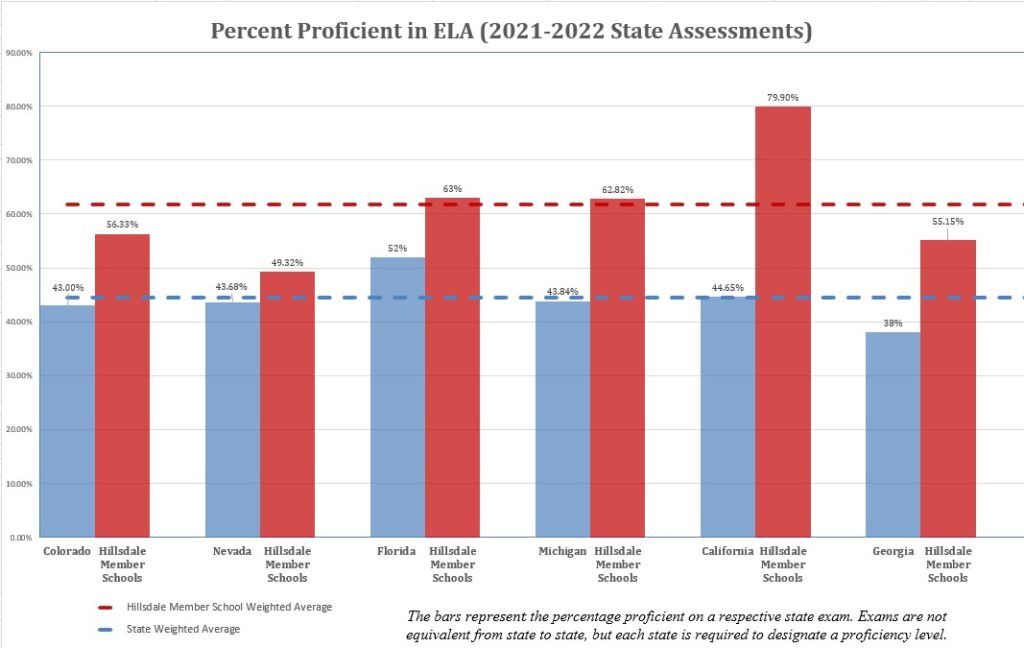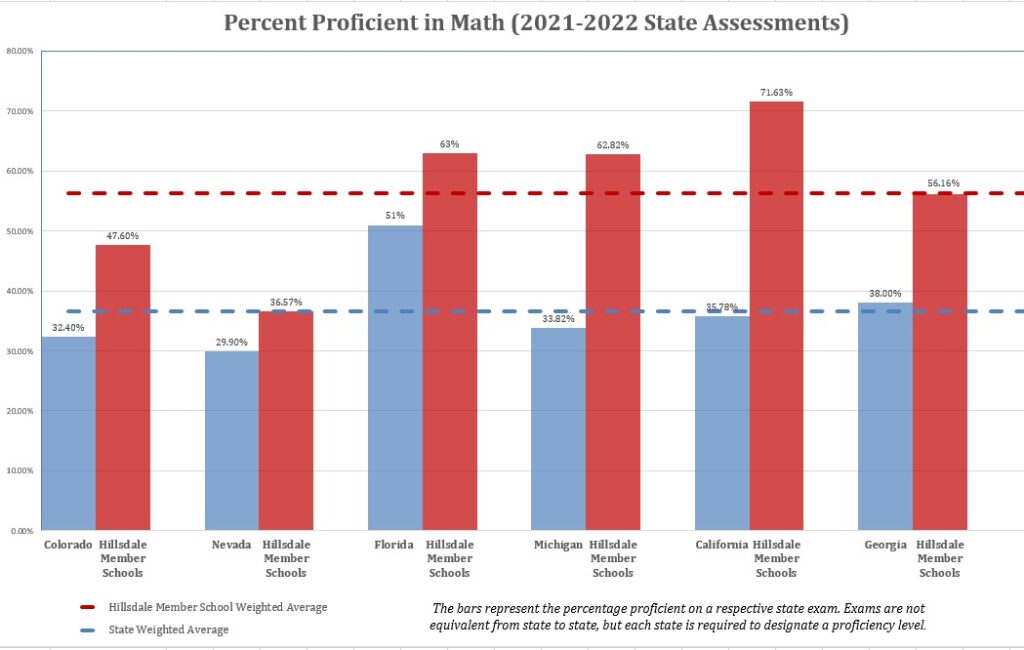After a smear campaign ensnared efforts to bring three new no-politics, high-achievement public schools to Tennessee in September, the families denied yet another year of the education they seek for their children aren’t retreating. They’ve just filed notices they wish to open five classical charter schools in Tennessee that use curricula designed by Hillsdale College.
“All of the schools are overcrowded, the county schools can’t build out fast enough,” noted Michelle Garcia, a Rutherford County mother of two who serves on the nonprofit board attempting to open the schools, American Classical Education (ACE). “Between that and the learning loss of Covid, having this public classical charter option is very attractive.”
Garcia said that not only did school lockdowns and subsequent rolling quarantines of healthy children deeply damage Tennessee parents’ confidence in conventional schools, but many local parents also want the high-quality curriculum and pursuit of virtue championed in classical schools.
An October poll found 56 percent of Tennesseans would not send their child to their ZIP code-assigned public school if they felt they could afford another one. Fifty-nine percent of the heavily Democrat-leaning poll respondents in the overwhelmingly Republican state agreed Tennessee should offer more public school options.
“The culture has changed so much in school with Covid, we really need something else to come in educationally and shake things up a little bit,” said Rutherford County mother of three Mandy Massey in a phone interview. Massey hopes for the opportunity to enroll her daughters in a classical school should the government allow one to open in her area.
Whose Kids, and Whose Money?
Currently, 22 K-12 schools in 11 states use Hillsdale’s staff training and curricula, and another 50 use its curricula alone. Although test scores offer only a limited picture of school quality, and all Hillsdale-affiliated schools did not have 2021-22 testing data, the most recent available show them outperforming state averages.


Classical, private, and charter schools generally operate at far lower per-pupil costs than conventional public schools and educate to a higher academic level. Charters do so while fulfilling legal obligations to accept any student, including special-needs children and non-native English speakers. Yet for effectively educating citizens in America’s founding principles using classical methods, Hillsdale is the regular target of media smear campaigns such as that in Tennessee.
In January’s state of the state address, Gov. Bill Lee listed establishing Hillsdale-affiliated charters as a top priority of his administration, later announcing he wanted 50 to 100 opened in his booming state. Then in June, Hillsdale President Larry Arnn was secretly recorded criticizing teacher training at a private event with Lee, and the recording leaked to a local TV station.
A few Republicans, including Tennessee House Speaker Cameron Sexton and the House education committee chairman, rewarded the malicious leak and media distortions with public condemnations of Arnn’s factually accurate remarks. The pile-on between the media arm of the Democrat Party and the beneficiaries of an education system in which one-third of eighth graders are functionally illiterate also led to a Chattanooga charter school dropping the Hillsdale curriculum.
The months-long election-year smear campaign, however, went nowhere with voters. Lee refused to capitulate to the media mob on the schools project, tacked harder to his right on moral issues such as banning library pornography aimed at kids, and won re-election in November by 32 points. Now ACE plans to apply to open even more classical public schools than they pursued last year.
Can Democrats Say What Republicans Can’t?
ACE provided The Federalist exclusive news of their December notices of intent to apply to open schools in Montgomery, Rutherford, Madison, Maury, and Robertson counties. To open a charter school in Tennessee, applicants must first petition the nearest school district. If the district denies the petition, which is typical, the applicants can appeal to a new statewide commission. The governor appoints the Tennessee Public Charter Commission’s members.
In September, ACE withdrew appeals to this commission for three planned schools. ACE Chairwoman Dolores Gresham, a former chair of Tennessee’s Senate education committee, cited the hearing’s conflict with fall break for many supporting families and the desire to strengthen their applications in response to the misinformation campaign.
In the leaked recording, Arnn criticized teacher training, which half a century of research has established is ineffective and even frequently pro-Marxist: “The teachers are trained in the dumbest parts of the dumbest colleges in the country, and they are taught that they are going to go and do something to those kids,” he said.
Arnn’s comments were depicted as criticizing teachers instead of teacher training, despite efforts by the college to correct the record. Such criticism is bipartisan and backed up by decades of research findings. It’s implicit in Tennessee’s decades of attempts to reform its schools and teachers’ colleges.
“Our state board of education has tried to rodeo the teacher preparation programs in Tennessee because we’ve been aware for years that perhaps we’re not preparing teachers well enough,” Grisham noted.
In 2009, President Obama’s Education Secretary Arne Duncan also criticized teacher preparation in a Columbia University speech. Duncan called most teachers’ colleges “cash cows” and “sleepy backwaters,” noting that “too many incoming [college] freshmen don’t know the content because they’ve been taught by teachers whose own content knowledge is insufficient.”
Tennessee requires students to have a GPA of 2.75 or higher to enter teacher training, according to the National Council on Teacher Quality. That’s a C-plus to B-minus grade average. The latest data from the ACT test shows the majority of college-bound high school students, 55 percent, maintain an A grade point average. This means Tennessee’s academic standards for those teaching children are set at the lowest quarter of students who take college entrance exams.
Prospective teachers can answer nearly half the questions wrong on their entrance and licensure tests and still pass, according to current Tennessee cut scores. While the state has closely supervised teacher training since 2007, its reports do not show teacher candidates’ score distribution on licensure tests, only whether they met the minimum required. Most do.
Desperate Defenses of a Reform-Resistant System
Tennessee lost more ground than the nation as a whole on 2022’s federally mandated National Assessment of Educational Progress in fourth- and eighth-grade reading. Black and Hispanic children suffered the most.
“The drops on this year’s national scores generally returned Tennessee to its lowest NAEP performance in math and reading since 2011,” reported Chalkbeat Tennessee, a Bill Gates-funded anti-Republican outlet, in October.
The 2022 state tests showed a rosier picture, but state tests are well-known for applying lower education expectations than independent tests to deflect robust accountability. In the last two years, the state has not reported teachers’ classroom performance as measured by student test scores because lockdowns disrupted those tests.
Before lockdowns caused further achievement drops, approximately half of Tennessee college students required remedial classes, indicating poor K-12 preparation even for the college-bound. International research backs up this reality, finding that even the highest-ranked U.S. public school districts are academically mediocre when compared with international peers.
“It appears that the attempted reforms of public education continue to be ineffective. And so, rather than keep climbing this hill, the people and the legislature have looked for alternatives,” Gresham said.
The people overseeing Tennessee’s public education system are blaming everyone but themselves for these realities. For example, Tennessee’s superintendents’ organization denounced Arnn’s comments, loftily proclaiming “the value of public education and public school teachers” while siphoning off Tennessee teachers’ salaries for non-teaching staff, including themselves.
From 1992 to 2015, Tennessee public schools added two school employees for every additional student, according to an EdChoice study. Per-student spending in Tennessee went up an inflation-adjusted 41 percent in that period, but teacher compensation went down 2 percent. Tennessee teachers could earn $11,202 more per year each if school staffing had only increased at the same level as student enrollment instead of double, the study author calculated.
“If what is in place is not working, then you look for alternatives,” Gresham said. “Today, in Tennessee, that’s what parents are looking for. They desire it, and they demand it.”
What These Tennessee Parents Want and Why
Teacher and curriculum quality are the two top factors schools control that affect student achievement, according to high-quality research. Classical schools seek to embody this reality by hiring teachers willing to become knowledge experts who display strong personal character, and with a cohesive core curriculum built on enduring human knowledge.
A classical school “sees itself as not pulling the kid from their parent to educate or indoctrinate them but … as an extension of the parent’s desire to educate their children,” said ACE Vice President of Schools Phillip Schwenk, a 30-year public school principal and teacher, in an interview.
Classical schools emphasize complete and original classic texts so students can participate in the “great conversation” throughout human history about man’s purpose, what is good and evil, and why. They emphasize moral and mental virtues, learning from stories, music and poetry, artistic excellence, scientific inquiry, and strengthening one’s mind instead of outsourcing conversation, relationships, and memory to robots.
“We believe that wonder is the beginning of philosophy — that is Aristotle,” said Schwenk. “We believe that learning is a joyous struggle. A lot of kids really enjoy learning in an ordered place.”
The ancient Greek philosopher Socrates’ truth-seeking and inquisitive teaching style lives today in these schools, not only in examining his ideas but also in “Socratic dialogues” with older students. It’s a teaching method intended to help students discover and apply enduring truths.
“A lot of people are arguing that what’s happening in conventional schools is indoctrination,” Schwenk said. “We’re not trying to counter indoctrinate, we just want people to be able to think freely.”
Other hallmarks include taking school seriously, as exhibited by the norms of student uniforms and professional dress among teachers. The youngest students in Hillsdale-affiliated charters have three recesses per day as well as art and music every day, Schwenk said.
“There’s definitely an emphasis on public speaking, on having an informed debate, on reasoning with people who share different viewpoints. That’s really not at all practiced in the public schools,” said Garcia. “It’s about forming a whole student that can present well, can speak well, can reason, looks for answers, is a critical thinker. Just a really well-rounded person.”
‘Just Did Not Meet Our Needs’
Last year, the Garcias pulled their son out of public school for a private classical school. Because she believes many parents cannot afford private tuition and that providing opportunities for children based on income is unfair, Garcia has joined the effort to bring a Hillsdale charter school to her home of Rutherford County — a quickly growing area in central Tennessee surrounding the city of Murfreesboro.
“I worked in prison ministry, and I didn’t realize how much the public school [my son] was in felt like a prison until I went to the classical school,” Garcia said. “I have never wanted to be a basher of the public schools, but they just did not meet our needs.”
Covid lockdowns were the final straw in their family’s increasingly frustrated relationship with their government-assigned school, Garcia said. She said she’s been amazed and inspired by how a classical school has benefitted her son, starting with highly personalized attention and high expectations.
In public school, her son was allowed to ignore deadlines, Garcia said. His classical school gives detention for assignments more than two days late, a policy Garcia supports because “part of the decay of our society is when there are no consequences for your actions. … You never learn if there are no consequences. I want my son to have these good habits to be accountable to his boss, to his family, and to learn to be responsible.”
The school’s staff are both firm and kind, she said: “When I had my first parent-teacher conference with the new teachers, I very nearly ended up in tears because I was so impressed by the genuine effort they were taking to connect with my son.”








